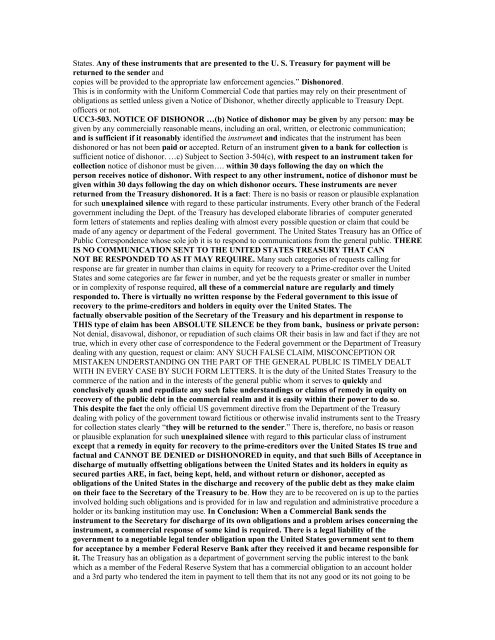Mortgage-KillerEX
Mortgage-KillerEX
Mortgage-KillerEX
You also want an ePaper? Increase the reach of your titles
YUMPU automatically turns print PDFs into web optimized ePapers that Google loves.
States. Any of these instruments that are presented to the U. S. Treasury for payment will be<br />
returned to the sender and<br />
copies will be provided to the appropriate law enforcement agencies.” Dishonored.<br />
This is in conformity with the Uniform Commercial Code that parties may rely on their presentment of<br />
obligations as settled unless given a Notice of Dishonor, whether directly applicable to Treasury Dept.<br />
officers or not.<br />
UCC3-503. NOTICE OF DISHONOR …(b) Notice of dishonor may be given by any person: may be<br />
given by any commercially reasonable means, including an oral, written, or electronic communication;<br />
and is sufficient if it reasonably identified the instrument and indicates that the instrument has been<br />
dishonored or has not been paid or accepted. Return of an instrument given to a bank for collection is<br />
sufficient notice of dishonor. …c) Subject to Section 3-504(c), with respect to an instrument taken for<br />
collection notice of dishonor must be given…. within 30 days following the day on which the<br />
person receives notice of dishonor. With respect to any other instrument, notice of dishonor must be<br />
given within 30 days following the day on which dishonor occurs. These instruments are never<br />
returned from the Treasury dishonored. It is a fact: There is no basis or reason or plausible explanation<br />
for such unexplained silence with regard to these particular instruments. Every other branch of the Federal<br />
government including the Dept. of the Treasury has developed elaborate libraries of computer generated<br />
form letters of statements and replies dealing with almost every possible question or claim that could be<br />
made of any agency or department of the Federal government. The United States Treasury has an Office of<br />
Public Correspondence whose sole job it is to respond to communications from the general public. THERE<br />
IS NO COMMUNICATION SENT TO THE UNITED STATES TREASURY THAT CAN<br />
NOT BE RESPONDED TO AS IT MAY REQUIRE. Many such categories of requests calling for<br />
response are far greater in number than claims in equity for recovery to a Prime-creditor over the United<br />
States and some categories are far fewer in number, and yet be the requests greater or smaller in number<br />
or in complexity of response required, all these of a commercial nature are regularly and timely<br />
responded to. There is virtually no written response by the Federal government to this issue of<br />
recovery to the prime-creditors and holders in equity over the United States. The<br />
factually observable position of the Secretary of the Treasury and his department in response to<br />
THIS type of claim has been ABSOLUTE SILENCE be they from bank, business or private person:<br />
Not denial, disavowal, dishonor, or repudiation of such claims OR their basis in law and fact if they are not<br />
true, which in every other case of correspondence to the Federal government or the Department of Treasury<br />
dealing with any question, request or claim: ANY SUCH FALSE CLAIM, MISCONCEPTION OR<br />
MISTAKEN UNDERSTANDING ON THE PART OF THE GENERAL PUBLIC IS TIMELY DEALT<br />
WITH IN EVERY CASE BY SUCH FORM LETTERS. It is the duty of the United States Treasury to the<br />
commerce of the nation and in the interests of the general public whom it serves to quickly and<br />
conclusively quash and repudiate any such false understandings or claims of remedy in equity on<br />
recovery of the public debt in the commercial realm and it is easily within their power to do so.<br />
This despite the fact the only official US government directive from the Department of the Treasury<br />
dealing with policy of the government toward fictitious or otherwise invalid instruments sent to the Treasry<br />
for collection states clearly “they will be returned to the sender.” There is, therefore, no basis or reason<br />
or plausible explanation for such unexplained silence with regard to this particular class of instrument<br />
except that a remedy in equity for recovery to the prime-creditors over the United States IS true and<br />
factual and CANNOT BE DENIED or DISHONORED in equity, and that such Bills of Acceptance in<br />
discharge of mutually offsetting obligations between the United States and its holders in equity as<br />
secured parties ARE, in fact, being kept, held, and without return or dishonor, accepted as<br />
obligations of the United States in the discharge and recovery of the public debt as they make claim<br />
on their face to the Secretary of the Treasury to be. How they are to be recovered on is up to the parties<br />
involved holding such obligations and is provided for in law and regulation and administrative procedure a<br />
holder or its banking institution may use. In Conclusion: When a Commercial Bank sends the<br />
instrument to the Secretary for discharge of its own obligations and a problem arises concerning the<br />
instrument, a commercial response of some kind is required. There is a legal liability of the<br />
government to a negotiable legal tender obligation upon the United States government sent to them<br />
for acceptance by a member Federal Reserve Bank after they received it and became responsible for<br />
it. The Treasury has an obligation as a department of government serving the public interest to the bank<br />
which as a member of the Federal Reserve System that has a commercial obligation to an account holder<br />
and a 3rd party who tendered the item in payment to tell them that its not any good or its not going to be












![[Pham_Sherisse]_Frommer's_Southeast_Asia(Book4You)](https://img.yumpu.com/38206466/1/166x260/pham-sherisse-frommers-southeast-asiabook4you.jpg?quality=85)




